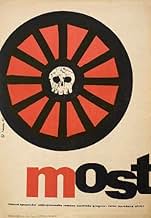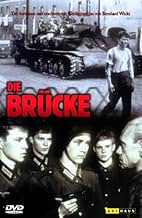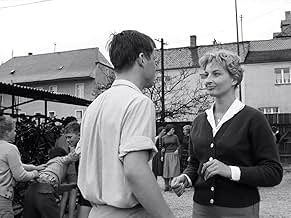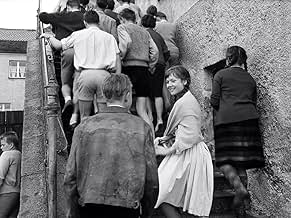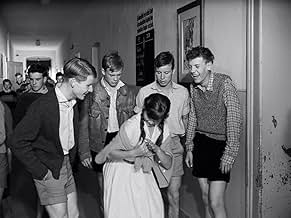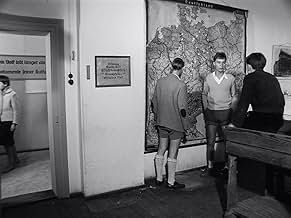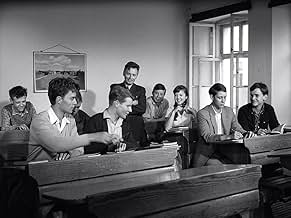CALIFICACIÓN DE IMDb
7.9/10
9.1 k
TU CALIFICACIÓN
Agrega una trama en tu idiomaIn 1945, Germany is being overrun, and nobody is left to fight but teenagers.In 1945, Germany is being overrun, and nobody is left to fight but teenagers.In 1945, Germany is being overrun, and nobody is left to fight but teenagers.
- Dirección
- Guionistas
- Elenco
- Nominado a 1 premio Óscar
- 16 premios ganados y 1 nominación en total
Volker Bohnet
- Hans Scholten
- (as Folker Bohnet)
Günter Hoffmann
- Sigi Bernhard
- (as Günther Hoffmann)
Opiniones destacadas
Die Brücke was on Dutch or Belgian TV some 20 years ago, when I saw it. Like many others I was deeply impressed. There has been criticism on acting and directing. This criticism is correct. But it does not matter. What counts is the script. Only seldom I have seen a movie with a better script. Here a modified quote from The Good, the Bad and the Ugly applies: never seen wasted young lives so badly. With a fairly simple story Die Brücke makes mercilessly clear what war and National-Socialism is. I can understand, why nobody has the courage to do a remake. Perfection might lead to a lesser impact in this case. One can argue, that Paths of Glory and Hamburger Hill are better. Not a bad word about these two, but Die Brücke is emotionally the most gripping.
I lived through that time, I was seventeen, and I know fourteen year olds were fighting to the last " boy ". The realism of this film still takes me back to '45. It happened that way.
When I saw in news accounts the lovely yet fearful face of a 16 year-old, who had defected from the Taliban during the campaign against terrorists in Afghanistan, in the aftermath of the 9/11, I was taken back to Bernhard Wicki's Die Brücke (The Bridge), to the faces of young German boys who were recruited by the Nazis to defend a "last" bridgehead, in the final days of World War II in Europe. In both cases, young "true believers" were used as cannon fodder by cynical adults in their futile power games, which they had disguised as moral crusades.
A tiny band of boys, holding weapons as big as they, their bodies and faces still soft and fresh and tight, facing the juggernaut of tanks and artillery and machine guns which we know will soon tear them to pieces. And for what? An ideal?
I suspect that The Bridge was the basis for the Timothy Hutton, Sean Penn vehicle, "Taps". However, The Bridge is the starker and more brutal treatment because, unlike the what-if story of Taps, the what-if does not apply to The Bridge. In fact, throughout history, the use of children in furtherance of warfare has a sickening frequency, the earliest I know of being the Children's Crusade, and now we have the Tamil Tigers (little girls with lockets of cyanide vials) and Palestinian boy bombs.
The Bridge deserves to be revived and shown to as wide an audience as possible in this Dastardly New World we live in.
A tiny band of boys, holding weapons as big as they, their bodies and faces still soft and fresh and tight, facing the juggernaut of tanks and artillery and machine guns which we know will soon tear them to pieces. And for what? An ideal?
I suspect that The Bridge was the basis for the Timothy Hutton, Sean Penn vehicle, "Taps". However, The Bridge is the starker and more brutal treatment because, unlike the what-if story of Taps, the what-if does not apply to The Bridge. In fact, throughout history, the use of children in furtherance of warfare has a sickening frequency, the earliest I know of being the Children's Crusade, and now we have the Tamil Tigers (little girls with lockets of cyanide vials) and Palestinian boy bombs.
The Bridge deserves to be revived and shown to as wide an audience as possible in this Dastardly New World we live in.
A group of young students are ordered to protect a strategically totally unimportant bridge at the end of the war. The initial euphoria changes suddenly to fright while the Allies are entering. Probably one of the essential and most important anti-war films ever. Wicki convincingly captured the atmosphere of the last war days, this constant indecision between fear and hope and forlornness. Especially well made are the psychological portrays of the boys, their every day life in school, at home, within the clique and the mixture of real dedication and adventure mentality which leaves them to look at the war partly as national duty and partly as a romantic game. But as soon as the war collides with the life of the boys, the contrast between those close-ups of round-eyed, innocent child's faces and the churned up mud of the battlefield, as well as the bookish discourses of "courage" and "cowardice" makes the absurdity of the war pretty damn clear. Indeed, war is a game, but harrowing, arousing and bitter which has lost all gaily playfulness.
Made in 1959, "The Bridge" is one of the few films from the former West Germany that squarely faces the theme of Nazi defeat. It is a courageous work where content is all important, so much so that it hardly matters that the direction is rather limp and pedestrian and the acting somewhat less than impressive. It is an elegy to lost youth concluding with a caption that vents such anger through the irony of understatement that it earns without question a rightful place among the most seriously committed of anti-war films. The setting is an unspecified small town in Germany where to begin with, apart from a bomb dropped in the river and conversations about hardship and shortages, the war seems far more than a distant rumble away. We follow a group of seven 15 year old boys at school and play until the time when the rapidly approaching American front necessitates their call up and hasty military training. As the military front creeps ever closer they are given the role of defending a bridge over a river, the wisdom of which is seriously questioned by several of their superior offices but which they eagerly take on in the spirit of boyhood heroism combined with what one can well imagine to be the ideology instilled into them by past experience of the Hitler Youth. The terrible last half hour in which their baptism by fire is recorded in graphic detail through the stages of excitement, terror and death is gruelling to watch, the more so because the youth of the sufferers generates so much anger at such waste and loss. I would not for one moment claim the "The Bridge" is in the same league as Kubrick's "Paths of Glory", Helma Sanders-Brahms's "Germany, Pale Mother" or Klimov's "Come and See" - Bernhard Wicki is a lesser director who never quite succeeds in making each of the seven protagonists a memorable character - but nevertheless he manages convincingly to flesh out in dramatic form the terrible reality behind that awesome newsreel footage of Hitler encouraging boy troops amid the rubble of Berlin. "The Bridge" brings home more than most films the madness of it all.
¿Sabías que…?
- TriviaThe end credits suggest that the story relates to true events which supposedly happened on "April 27, 1945", but this specific story is fictitious, while the general use of teenage boys as soldiers in the last days of the Third Reich is accurate.
- ErroresWhen the boys are assembled at night, they are told they will be part of the 336th Division. That unit was destroyed and surrendered to the Soviets on the Eastern Front nearly a year earlier in 1944 and was never reformed.
- Citas
Sigi Bernhard: Whoever defends one square foot of German soil defends Germany!
- Versiones alternativasAn English dubbed version was released in the USA in 1963.
- ConexionesEdited into Bernhard Victor Christoph Carl von Bülow genannt Loriot (2008)
Selecciones populares
Inicia sesión para calificar y agrega a la lista de videos para obtener recomendaciones personalizadas
Detalles
- Tiempo de ejecución
- 1h 43min(103 min)
- Color
- Mezcla de sonido
Contribuir a esta página
Sugiere una edición o agrega el contenido que falta

